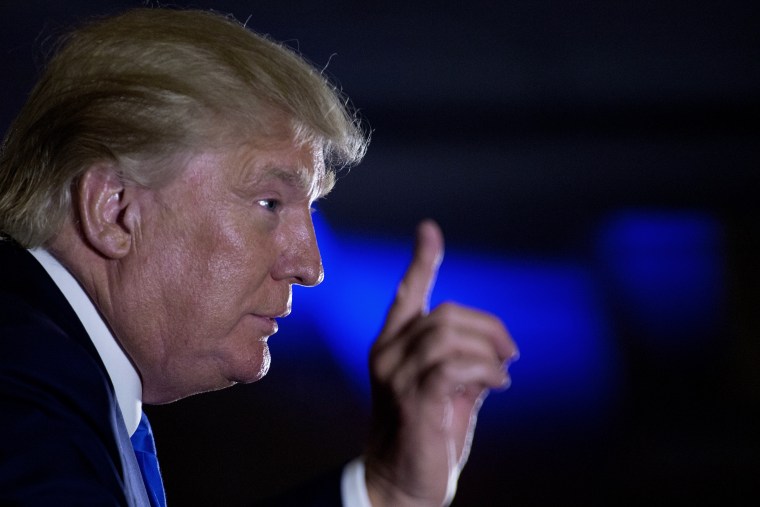There's some evidence of late that suggests Republican presidential hopefuls get a bump in the polls after their campaign kickoffs. It's a dynamic that makes sense -- when a candidate launches a bid for national office, he or she briefly gets the spotlight and puts his or her best foot forward.
When Ted Cruz formally entered the 2016 race, he saw his support grow, before it started to fade. Marco Rubio saw something similar. And with this in mind, it probably shouldn't have been too shocking to see Donald Trump
get a bounce in the polls after his highly publicized announcement two weeks ago.
But the alarming thing is, at least for now, that bounce hasn't started to come down.
Last week, two polls out of New Hampshire -- the nation's first primary state -- found Trump in second place in the crowded GOP field. Polls from
Suffolk and
CNN each showed Jeb Bush in the lead, with Trump close behind. Both surveys also found that Bush and Trump were the only candidates to generate double-digit support in the Granite State.
Nationally, a Fox News poll last week also showed Trump in second place.
This week, it's more of the same. Consider the new national CNN
poll.
Former Florida Gov. Jeb Bush and businessman Donald Trump top the list of GOP presidential contenders following their back-to-back campaign launches in mid-June, and are the only two Republican candidates holding double-digit support among Republicans and Republican-leaning independents.
According to the CNN results, Bush leads the GOP field with 17%, followed by Trump with 12%, and every other Republican candidate is further back with single-digit backing.
One poll can be dismissed as an outlier or a fluke. Overlooking all of these polls isn't quite so easy.
Politico reported the other day that Republican officials are starting to get nervous.
He has virtually zero chance of winning the presidential nomination. But insiders worry that the loud-mouthed mogul is more than just a minor comedic nuisance on cable news; they fret that he's a loose cannon whose rants about Mexicans and scorched-earth attacks on his rivals will damage the eventual nominee and hurt a party struggling to connect with women and minorities and desperate to win. "Donald Trump is like watching a roadside accident," said former George W. Bush press secretary Ari Fleischer. "Everybody pulls over to see the mess. And Trump thinks that's entertainment. But running for president is serious. And the risk for the party is he tarnishes everybody."
I think that's right, though GOP officials will also soon have to come to grips with an unsettling truth. To borrow Fleischer's metaphor, rank-and-file Republican voters are pulling over to see the mess, which Trump sees as entertainment. But the trouble is, a significant number of those voters are, in fact, entertained. They're looking at the roadside accident and saying, "I like that guy."
To be sure, I am deeply skeptical that the real-estate mogul/reality-show host will be able to sustain these levels of support in the coming months. It's entirely possible, if not likely, that Trump is a novelty, tapping into the Republican id for a short while, but the clown show will stop being amusing by the time Republican voters actually start weighing in early next year.
But in the meantime, these latest poll results suggest Trump is all but certain to qualify for the debate stage, denying a slot that would otherwise go to a more serious candidate.
The first debate, incidentally, is five weeks from tomorrow.
